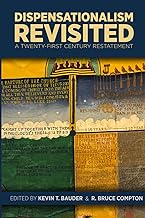The next essay in the book is by Ryan Martin and is about Israel and the Church and the issue of supersessionism with a concentration upon Romans 9 – 11. I want to say at the outset that Martin does not really deal with supersessionism very fully in this piece, so those wanting a clear refutation of that teaching may be disappointed. However, he does present a patient and reasonable exposition of the section with useful exegetical notes. He begins with a helpful review of Romans 1 -8 (198-201) which sets up the rationale for the following three chapters in Romans.
As he covers the first thirteen verses of Romans 9 he fails in my opinion to shine a light on the corporate aspects of election which Paul has in mind (e.g., Rom. 9:3-5, 6, 7-8, 10, and 13). This is a common mistake since the Apostle is often construed as teaching about individual salvation. But this is not what he tells us in the passage (Rom. 9:3-4, 27, 31-33. cf. 10:1, 21; 11:1-2, 5, 7, and the “they/you” contrast in 11:11-25. Also, notice – as Martin does – that Pharaoh is used as an exemplar of “hardening” which is then applied to Israel corporately in 11:25 as “blindness,” 211). Hence, Martin’s exegesis of Romans 9:15-29 gets bogged down in the salvation of individuals and not elect Israel (204). He does, however, deal skillfully with Romans 9:24, saying “it makes little sense for Paul, at this stage of his argument, to introduce the idea of God now calls Gentiles ‘my people'” (205).
When he reaches Romans 11 Martin pinpoints the logic of Paul’s concern. If the Church is fulfilling the promises to Israel spiritually then why doesn’t he just say so? (210). When he expounds 11:16-26 the deliberate contrast between Israel and the Gentiles (not Church – 232) is emphasized well (e,g., 216 quoting Lanier Burns, whom the author relies on a lot). The remaining part of the essay which focusses especially on Romans 11:25-27 is very good. In it the author builds a case for “all Israel” being first Jews turning en masse to Christ (226), and then identifying them as elect [national] Israel as separate from the Church (232). He also exegetes Romans 11:26b-27 as a New covenant passage. The chapter is a little long but has much to commend it.
W. Edward Glenny then contributes a chapter on the premillennial understanding of Revelation 20 as opposed especially to amillennialism. Those familiar with Glenny’s work know that this will be a good essay, and Glenny doesn’t disappoint. It is not that he really says anything new, but rather in the way he calmly argues his points that makes it as good as it is. I’m not going to run through the details as they are too well known. All that needs to be said is that this is a great exposition and a persuasive presentation of the vast superiority of the premillennial understanding of Revelation 20.
Concluding the essays is Jonathan Pratt’s discussion of the pretrib rapture. What is needed when writing on this subject is a. information, b. balance, and c. no overreach. I though Pratt did a good job on the first count, and a fair job on the other two. He chooses three texts in which he believes exegetical arguments are strong: John 14:1-3; 2 Thess. 2:6-7; and Rev. 12:5 (250-259).
He did well with these passages, but when all is said and done none of them furnish a lot of exegetical grist for the pretribulationist’s mill. A valid alternative exegetical conclusion for John 14:1-3 is that Christ prepares a place for the disciples, as well as for those who come after them. There is no necessary pretribulational link in this scenario. In 2 Thess. 2 the removal of the Restrainer (the Holy Spirit) who is “taken out of the way” (2 Thess. 2:7) “could refer to the removal of the Holy Spirit through the removal of the church in the rapture.” (255-256). Well, it could, but if it is a reference to the rapture it is extremely veiled. Thirdly, the position that the mention of the “man child” in Rev. 12:5 refers to the Church as well as Christ via “a double referent” (257) looks obtuse and unconvincing. I have encountered this before in the work of Michael Svigel (whom Pratt leans on), and while I respect Svigel I can’t keep out of my mind that his arguments in this case sound very like the type of arguments Covenant theologians employ to arrive at their conclusions. A lot of weight is put on the assertion that John is alluding to Isaiah 66:7 here. But he isn’t! Isaiah 66:7 is a metaphor relating to the re-birth of Israel’s kingdom in the next verse. Of course, someone like G. K. Beale (257 n. 40) is going to argue for such an allusion because he spiritualizes any verse he wishes, but what is a Dispensationalist doing following suit? And to what end? Many fellow Dispensationalists are rightly far from won over by such strained exegesis!
Pratt then offers several theological arguments for pretribulationism, and here he does better. He ought to have led with these in my opinion. One little annoyance with the essay was Pratt’s insistence that PreWrath is basically warmed over midtribulationism (249 n. 3). I trow not!
As stated previously, the book ends with a very nice set of tributes to Dr Hauser. As well as an index, what this book lacks is a chapter on refining or improving Dispensationalism. Some of the chapters are excellent (Beacham, Bauder, Glenny), some are good (Barrick, Compton, Pettegrew, Martin), and some are lacking. Since many pages are taken up with the first two categories I recommend Dispensationalism Revisited to all readers.



